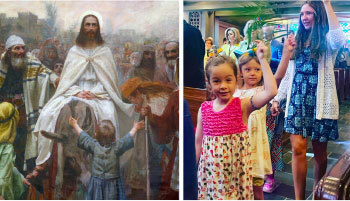
Holy Week explained
Sometimes the words we use at church can sound like a foreign language. If you or someone close to you, a friend, family member or neighbor are not “in the know,” you might find yourself wondering, “What in the world are these people talking about?” Even simple words like sin, grace or holiness can sound like insider talk, not to mention ideas like Trinity, incarnation, predestination, supralapsarianism … you get my point!
It's not just church words. We are in the season of Lent, making our way to Holy Week, and the services we promote might be strange to someone who has not grown up with them. One might ask, “What in the world is “Palm Sunday?” I imagine a whole room of people face-palming, or maybe it’s the one Sunday Presbyterians raise their hand in worship? Why are we celebrating Monday on Thursday? And why do Christians talk about Good Friday when that’s the day celebrating that God died?
If you, or someone you love, has ever had such questions, you’ve come to the right place. Below is a brief synopsis of what happens during the week leading up to the death and resurrection of Jesus which we call Holy Week; and what these signify for followers of this Jesus, who we believe to be the Son of God and the one anointed by God, our Messiah.

Palm Sunday kicks off Holy Week and invites us to relive Jesus’ entrance into Jerusalem toward the end of his earthly ministry. Jesus rode a donkey into town, and the crowds laid down palm branches before him, declaring him to be the Son of David – the long awaited and yearned for King. The word associated with Palm Sunday is “Hosanna,” which is a cry for deliverance. The Jewish people had waited for a king to save them and destroy their enemies, and they believed Jesus to be this king. As we worship on Palm Sunday, we declare that Jesus is the king who came to save, though not in the way anyone expected.

This moves us to Maundy Thursday, which takes us through Jesus’ final night with his disciples and the celebration of the Passover – the meal that commemorated God’s deliverance of the Israelites from slavery in Egypt. The word “Maundy” traces back to the Latin word mandatum, meaning commandment. While at the table, Jesus gave his disciples the command to love one another and showed this love by washing their feet, a task only performed by servants. Through humility, Jesus demonstrated the costly nature of love and pointed ahead to his death on the cross. This service ends in darkness and the congregation is invited to leave in silence in remembrance that on this night Jesus was betrayed, abandoned by those closest to him, and handed over to be killed by evil men.
Stepping into the darkness of these events, we come to Good Friday, the service where we recount the death of Jesus and his seven last words from the cross. In this somber service, we remember it was for us that Jesus died. Why do we call it good? We might say that it is good because only through Jesus’ substitutionary death can we receive forgiveness of our sin. In another sense, this day can only be called good in hindsight, because of what comes after, and the realization that death is not the end of the story.

This brings us, finally, to Easter, which is arguably the highpoint of the Christian calendar. Easter begins with a sunrise service which starts in the darkness that met us on Maundy Thursday and Good Friday. But the joyful proclamation that soon comes is the celebration of Christ’s resurrection from the dead. Jesus is alive! That is the good news of Easter. That word “resurrection” is important. Easter is not about resuscitation as Jesus did not have a near death experience, and he did not come back to life only to die once again. Easter is not about Jesus’ spiritual life as Jesus’ soul did not rise to heaven. No, Easter is about resurrection.
It is about Jesus’ bodily rising to new, incorruptible life that we believe to be a sign of things to come for us through faith in him.
What I love about Holy Week, is that it meets us amid real life. There are days of great joy, days when we see Christ as the King come to rescue us. And there are days when we wonder where Christ is, days when we feel like the grave has won. There are days when we are faithful, days when we feel the Spirit moving in our midst, and there are days when we deny and reject Christ by our words and actions. This is real life on this side of eternity. Yet at the end of the day, our hope, our confidence, our joy is that Christ has been raised. He is alive, victorious, the conqueror of death and sin, and we know that we too have been given the victory through Christ Jesus our Lord!

About the author: Dan Hutchinson is the senior associate pastor at First Church. Dan graduated from Princeton Seminary with a Master of Divinity in 2012. He received a B.A. in History from Wheaton College in 2007 and an M.A. in Theology in 2008. He is a third-generation pastor.